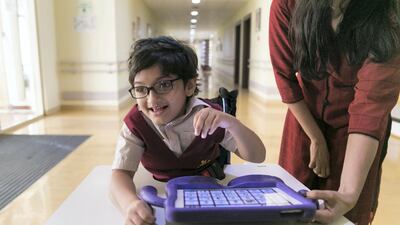“Hello, my name is Zahra. I’m awesome.”
By pressing a few keys, Zahra picks out a greeting, chooses cheerful and teary emoticons. She even cracks a joke by hitting a button to say, “I fooled you” after she pretends to identify the wrong colour when quizzed by her teacher.
To help her communicate, Zahra and other children with conditions ranging from cerebral palsy to development disabilities, use speech software loaded on to a tablet attached to their wheelchairs.
Assistive technology devices are being used by children in the Al Noor Training Centre to play musical instruments, operate a computer, splash paint on canvas, design garments, switch on a kettle, handle a sandwich maker and even play video games.
Zahra laughs and looks directly at the person she is addressing when she jabs out her responses to simple questions about her day and the meals she ate. Her teachers say this would not have been possible without assistive devices.
“All our students have innate creativity and talent that does not get an opportunity to express itself because they have physical and cognitive limitations. The devices give them an opportunity to express their creativity, give them access to art that otherwise they would not have had because they can’t hold a conventional paint brush or crayon,” said Deepika Gopalarao, coordinator rehabilitation services at Al Noor.
“This enhances their self-esteem and addresses any feeling of frustration or behavioural challenges because it makes them confident.”
________________
Read more:
Wheelchair users call on developers to consult them on access issues
Dubai to retrofit thousands of buildings to improve disabled access
________________
In a sunlit music room, pupils and care givers practice a song. The room fills with the sounds of drums, guitars, pianos and cymbals as the teacher instructs them to keep time while they hit their keyboards or tablets that replicate the sound of the instruments.
In the art room, some use a large version of a mouse to choose a range of colours via a device called the switch technology. Their art work is displayed on mugs, t-shirts, posters and conference logos.
Pupils with stronger motor skills use eye gaze technology to draw designs then converted into bags, gowns and garments on display at the centre’s store.
The devices also give them the ability to make their own choices when listening to music, watching television or video.
“A student with severe physical disability can use eye gaze tech to change channels and watch a programme of his choice. He is then not dependent on a caregiver and does not have to watch what the caregiver wants. That autonomy is very important, they can make decisions for themselves,” said Ms Gopalarao.
The centre has adapted technology in printing, baking, wood design, fashion technology so these can be operated by students in vocational training units.
In a large computer room with yellow walls, students are absorbed in colouring images, creating graphic designs or practicing typing skills. The skills learnt could help secure an office job.
There is some time allotted for video games with a few students promised additional minutes if they complete the tasks assigned.
“Only five minutes more, yes?” asks Jad, a pupil hoping to stretch a gaming session.
After reminding the teacher that he must save all paint work on file, he shouts along with her to count down to the start of a racing game.
Some have moved on to regular computers after training with a large mouse track ball and colour coded keyboards to differentiate numbers and vowels.
The aim is for technology to make them self-reliant in daily life, leisure and education.
But due to high costs, most devices are used at the centre and not adopted in homes. Experts hope collaboration between universities, families, people working in the disability sector and industry will drive down costs and spread use of the devices.
“This technology is not something you can pick up off the shelf and give somebody,” said Isphana Al Khatib, Al Noor’s director.
“Assessments have to be appropriate and require training for families. We also want professionals to understand that working with technology should be a first choice as opposed to a last choice because it can make a huge difference.”
A three-day exhibition aims to showcase the students’ ability and encourage companies to come forward with employment initiatives and training.
Residents can interact with students while they use assistive technology to print a movie ticket, handle a movie screening, prepare and serve coffee and ring up a grocery store bill.
The Al Noor Training Centre’s Assistive TechX exhibition and workshops runs from 10am until 8 pm from Wednesday until Friday.


